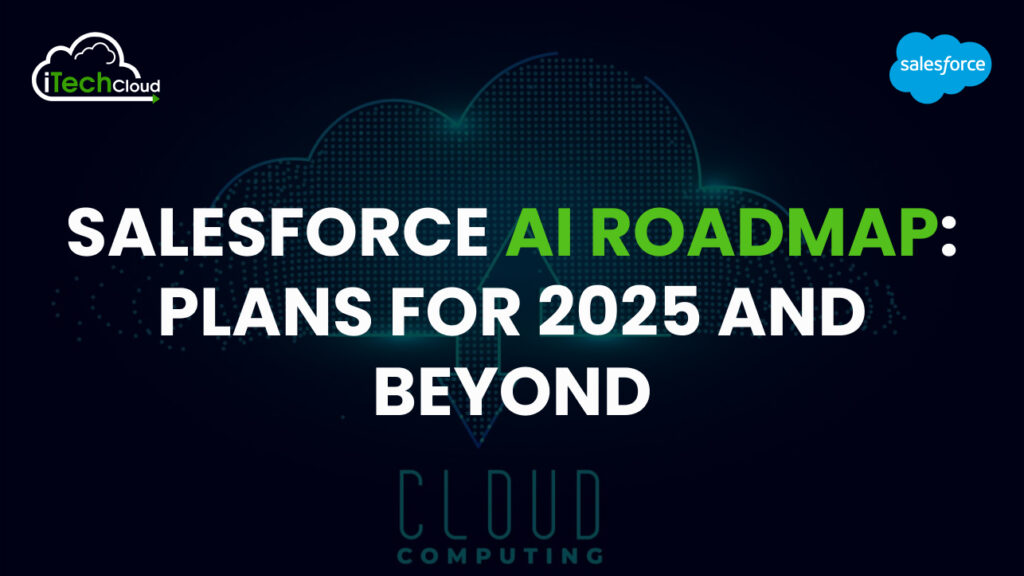Salesforce AI Roadmap: Plans for 2025 and Beyond

Salesforce is poised to revolutionize the landscape of artificial intelligence (AI) with its ambitious Salesforce AI Roadmap 2025 and beyond. As the leading customer relationship management (CRM) platform, Salesforce is integrating advanced AI capabilities that will transform how businesses operate, engage with customers, and utilize data. This blog explores the key predictions and strategies outlined by Salesforce leaders regarding the future of AI agents and their impact on various industries.
Table of Contents
The Emergence of Autonomous AI Agents
Salesforce vision for 2025 centers around autonomous AI agents, which are expected to become integral to business operations. These agents will not only assist in routine tasks but will also collaborate with one another, forming multi-agent systems capable of addressing complex challenges across organizations. This shift from single-agent applications to multi-agent orchestrations marks a significant evolution in how AI can enhance productivity and decision-making processes.
Key Predictions for AI Agents
1. Multi-Agent Systems:
By 2025, Salesforce anticipates that multi-agent systems will take precedence over traditional single-agent applications. These systems will handle intricate tasks such as developing marketing campaigns or simulating product launches by allowing different agents to work together seamlessly. This collaborative approach will enable businesses to tackle high-impact challenges more effectively, leveraging the strengths of various AI agents.
2. Agent-in-Chief:
As AI agents begin to operate autonomously, there will be a need for oversight mechanisms. Salesforce envisions the emergence of “chief-of-staff” agents responsible for managing other agents, ensuring that human oversight remains intact while maximizing the efficiency of AI operations.
3. Collaboration:
Future AI agents will be designed to collaborate on tasks akin to how ants work together in colonies. This evolution will redefine productivity, as agents will be able to share information and execute complex tasks collectively, thereby enhancing organizational efficiency.
4. Improved Customer Experience:
AI agents will be their ability to provide a seamless customer journey. By accessing comprehensive data across departments, agents can facilitate smoother transitions and personalized experiences for customers, eliminating the frustrations caused by fragmented communication.
5. AI Confidence:
As employees increasingly interact with AI tools, skepticism towards these technologies is expected to diminish. By 2025, more workers will rely on AI for everyday tasks, leading to greater confidence in its capabilities and ultimately improving return on investment for businesses.
Transforming Industries with AI
Salesforce roadmap highlights how different industries can leverage AI agents in unique ways:
1. Small and Midsize Businesses (SMBs):
SMBs are projected to gain a competitive edge by utilizing AI agents for scalable growth. These businesses can streamline operations, enhance customer engagement, and deliver personalized marketing strategies through autonomous agents.
2. Security Enhancements:
AI agents will play a crucial role in enterprise security by detecting vulnerabilities faster than human counterparts. As cyber threats evolve, these security-focused agents will adapt in real-time to protect organizational assets.
3. Actionable Analytics:
The introduction of “inspector agents” within the Agentforce framework will allow businesses to identify anomalies and opportunities automatically. This capability will enable analysts to focus on strategic decision-making rather than routine data monitoring.
The Role of Agentforce
Agentforce is a pivotal component of Salesforce strategy, providing a platform where organizations can create and deploy autonomous AI agents tailored to their specific needs. This platform is designed to simplify the development process for administrators and empower them to build dynamic user experiences without extensive technical expertise.
Features of Agentforce
1. User-Friendly Development:
Agentforce aims to make it easy for Salesforce admins to create custom AI agents that can interface with complex documentation or automate routine tasks effectively.
2. Dynamic User Experiences:
With Agentforce, organizations can develop tailored experiences that adapt to user needs in real-time, much like when dynamic forms were introduced in Salesforce.
Future Implications
The advancements in AI technology outlined in Salesforce ai roadmap are expected to have far-reaching implications for businesses and society:
1. Workplace Transformation:
With an estimated 41% of employee time currently spent on repetitive tasks, the integration of AI agents is set to free up valuable human resources for more strategic activities that foster innovation and growth.
2. Ambient Insights:
By 2025, it is predicted that 25% of analytical insights will be delivered “ambiently,” meaning they will be integrated into daily workflows without users needing to actively seek them out. This seamless integration could significantly enhance decision-making processes across organizations.
3. AI Governance:
As organizations increasingly rely on autonomous systems, establishing governance frameworks around AI use will become critical. This includes defining ethical guidelines and ensuring compliance with regulations as AI continues to evolve.
Conclusion
Salesforce AI roadmap 2025 presents a forward-thinking approach towards integrating autonomous AI into business processes. The predictions made by Salesforce leaders highlight a transformative future where multi-agent systems redefine productivity, enhance customer experiences, and empower organizations across various industries. As we move closer to this reality, businesses must prepare for the changes that come with adopting advanced AI technologies while maintaining a focus on ethical governance and human oversight.

